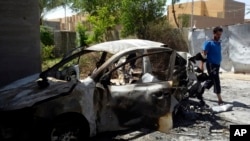Residents fleeing the fierce fighting between Iraqi forces and Islamic State (IS) militants in Fallujah are in a "state of shock", reeling from the gunfire and months of near-starvation.
According to the Norwegian Refugee Council (NRC), which has teams receiving those who manage to escape, the humanitarian situation in the city is desperate.
"Fighting has intensified, but there are still no safe routes out of Fallujah for the trapped civilians," NRC said in a statement Thursday.
Iraqi forces are now converging on the city from three different directions. Initial reports said the forces had met stiff resistance from IS fighters. The city has been under siege for almost six months, and little or no aid has gone in.
"The stories coming out of Fallujah are horrifying," NRC Iraq country director Nasr Muflahi said. "People who managed to flee speak of extreme hunger and starvation."
"The newly arrived are in a state of shock," the NRC said.
No safe way out
Plans set out by the Iraqi government to provide civilians with safe corridors to leave the city reportedly have not worked.
IS has also reportedly laced the roads with explosives, making escape that much more difficult.
"We will tear down the black flags of these despicable strangers who abducted this dear city. The time has come to liberate Fallujah and the victory will be ours," Iraqi Prime Minister Haider al-Abadi said Sunday.
The Iraqi army is backed by U.S. coalition airstrikes, a contingent of Sunni fighters, and a large number of Shi'ite militias.
Fear for civilian safety
Iraq's top Shi'ite cleric has called on the government and militia forces to spare the civilians trapped in the city.
The call was echoed by Abadi, Iraq’s minister of defense and the Popular Mobilization Commission that oversees the militias, and was welcomed by U.N. Special Envoy to Iraq Jan Kubis, who has also urged all parties in the fight to protect the lives of civilians.
"The people of Fallujah have suffered tremendously and the liberation should not add more suffering and destruction of property. Innocent civilians should not pay the price for the crimes of Daesh," Kubis said in a statement, using a local term for the extremist group IS.
Human rights organizations in the past have accused Shi'ite militias of reprisal killings.
Iraqi officials have been separating and screening the men from the families who have escaped to make sure none of them belong to IS.
"Anyone who leaves now, the occupied territory, should be very meticulously scrutinized and go through a security vetting procedure," Shia lawmaker and former National Security Advisor Mowaffak al Rubaie told VOA. But he acknowledged the system is open to possible misconduct.
"It is very difficult to strike a balance between human rights violations and applying a vetting procedure. But security is paramount," Rubaie said.
According to the United Nations, humanitarian agencies have been gearing up for weeks to provide protection, shelter, water, health care and food to those fleeing the city.






